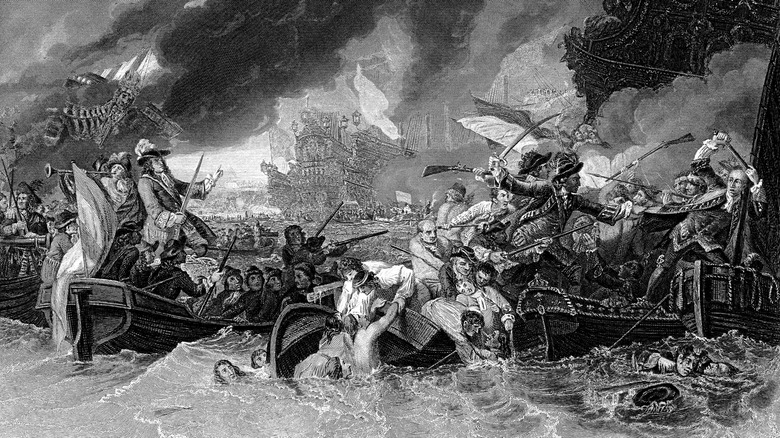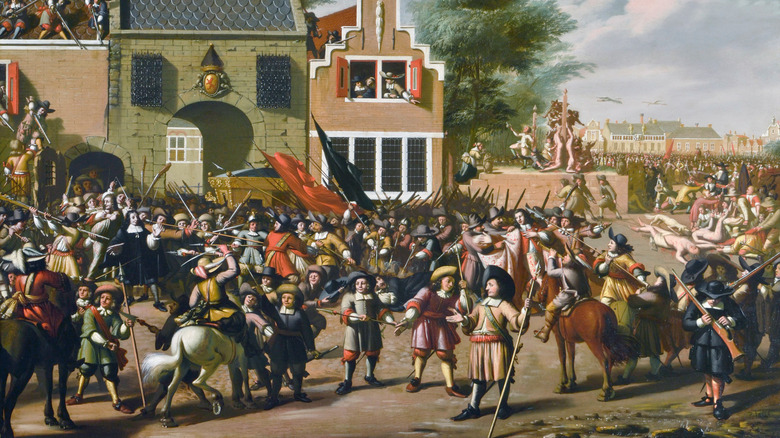17th Century Politician Johan De Witt's Gruesome Death Was Nothing Short Of Barbaric
These days, political assassinations are a rarity in the West, although they do happen from time to time. But centuries ago, it wasn't entirely unexpected when one's political career would come to an end in violence, particularly if their service coincided with a time of upheaval in the country. Such was the case with Dutch politician Johan de Witt. He was a powerful and influential politician, according to Dutch Review, and an advocate for republican (viz, not monarchical) governance at a time when just about every square inch of land in Europe was in one way or another governed by a king and/or queen. Being a republic worked out splendidly for the Dutch right up until when it didn't any more, and de Witt, alongside his brother, paid for this change in public sentiment with their lives. Indeed, their deaths weren't just a run-of-the-mill execution or assassination. One was gruesomely tortured and both wound up dying in rather inhumane and inglorious ways: Hung up in the public square, torn to pieces, and possibly cannibalized.
It remains one of the weirder points of European history
as well as a cautionary tale about the fickleness of popularity and the dangers of mob mentality.
The Dutch Republic
We're going to summarize centuries of complex and nuanced European history and how it touches against religion, military conquest, and related matters in a couple of sentences; needless to say this will be an extremely short version of an extremely long story.
According to Britannica, the Dutch Republic emerged around 1568 to 1609, following several Dutch provinces having won independence from Spain and then having formed a coalition. Being a Republic — which is to say, not a monarchy — was a rare thing indeed in Europe at that time. And, of course, it didn't last long. Today the Netherlands is, officially anyway, a constitutional monarchy, according to the Dutch Royal House's website.
Of course, there were ruling families here and there across the land who had held various offices for centuries, one of which was the House of Orange. And when the seams in the Dutch Republic started to split, it would be the House of Orange that would come in and sweep up the broken pieces. And two of those broken pieces were the bodies of Johan de Witt and his brother, Cornelis.
The 'Disaster Year'
It's hard to pinpoint the worst year in American history. While 2020 was pretty bad, so were 1861 and 1929, all of these for different reasons. The Dutch, for their part, have solidified 1672 as the worst year in their history, and they even have a name for it, according to Cambridge University Press: "Rampjaar," or "The Disaster Year." There was even a saying at the time: "het volk was redeloos, de regering radeloos, en het land reddeloos" — "the people were irrational, the government helpless and the country beyond salvation," according to Dutch Review.
The long and the short of it (and, again, we're leaving out considerable historical, economic, and religious context) is that the Dutch Republic was beset by a series of military defeats — remember, at this time, European powers were constantly going to war against one another. And someone had to take the blame for it. De Witt, who was from a powerful ruling family, had been the Prime Minister of the Dutch Republic for two decades before the Disaster Year. But when the Dutch suffered a series of defeats, the people, many of whom favored the monarchy-leaning House of Orange, decided they'd had enough.
The de Witt Brothers' Gruesome Ends
On June 21, 1672, according to the Dutch Review, a would-be assassin tried to kill de Witt. He survived, barely, but his ordeal wasn't over. Seeing the writing on the wall, the politician resigned, but public sentiment against him had soured to the point that simply resigning wasn't going to be good enough. Also at around this time, de Witt's brother, Cornelis, was imprisoned, possibly on trumped-up charges of treason, and sent to have a confession tortured out of him (a routine and inescapable part of European "justice" in those days). Cornelis never did confess, and instead was sentenced to exile.
Johan de Witt then made the fateful decision to go visit his brother in prison, according to The Vintage News. It would be a mistake that would cost them both their lives. When word got out that the two men were in town, an angry mob convened on the prison and ambushed the two men. The brothers were then hung from their feet in the town square. Soon enough, they'd both been torn limb from limb – later reports would claim that gruesome "souvenirs" — which is to say, body parts — would be seen on display here and there around The Hague. The crowd might not have even stopped at dismembering them, either. Some reports claim that their livers were removed and then roasted and eaten by the crowd, according to Dutch Review.



